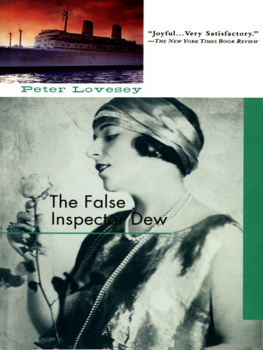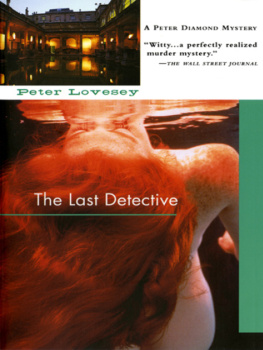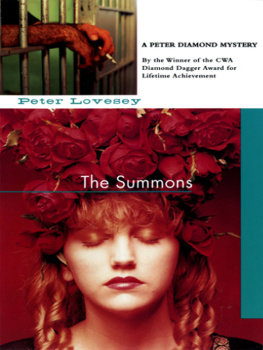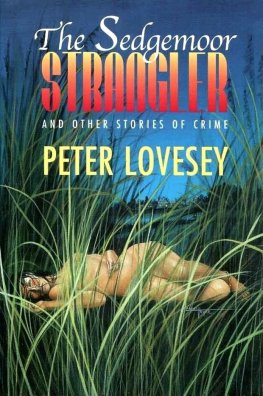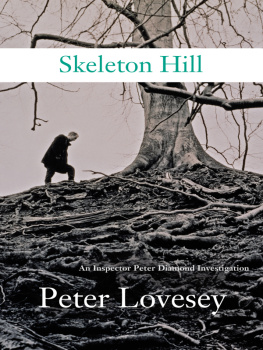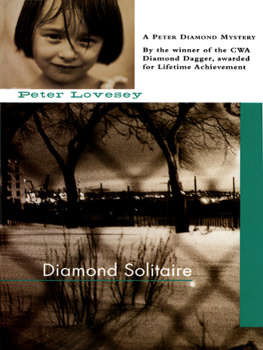Peter Lovesey - The False Inspector Dew
Here you can read online Peter Lovesey - The False Inspector Dew full text of the book (entire story) in english for free. Download pdf and epub, get meaning, cover and reviews about this ebook. City: New York, year: 1982, publisher: Soho Press, genre: Detective and thriller. Description of the work, (preface) as well as reviews are available. Best literature library LitArk.com created for fans of good reading and offers a wide selection of genres:
Romance novel
Science fiction
Adventure
Detective
Science
History
Home and family
Prose
Art
Politics
Computer
Non-fiction
Religion
Business
Children
Humor
Choose a favorite category and find really read worthwhile books. Enjoy immersion in the world of imagination, feel the emotions of the characters or learn something new for yourself, make an fascinating discovery.
- Book:The False Inspector Dew
- Author:
- Publisher:Soho Press
- Genre:
- Year:1982
- City:New York
- Rating:5 / 5
- Favourites:Add to favourites
- Your mark:
- 100
- 1
- 2
- 3
- 4
- 5
The False Inspector Dew: summary, description and annotation
We offer to read an annotation, description, summary or preface (depends on what the author of the book "The False Inspector Dew" wrote himself). If you haven't found the necessary information about the book — write in the comments, we will try to find it.
The False Inspector Dew — read online for free the complete book (whole text) full work
Below is the text of the book, divided by pages. System saving the place of the last page read, allows you to conveniently read the book "The False Inspector Dew" online for free, without having to search again every time where you left off. Put a bookmark, and you can go to the page where you finished reading at any time.
Font size:
Interval:
Bookmark:
THE FALSE INSPECTOR DEW
By the same author
WOBBLE TO DEATH
THE DETECTIVE WORE SILK DRAWERS
ABRACADAVER
MAD HATTER'S HOLIDAY
INVITATION TO A DYNAMITE PARTY
A CASE OF SPIRITS
SWING, SWING TOGETHER
WAXWORK
KEYSTONE
BERTIE AND THE TINMAN
ON THE EDGE
BERTIE AND THE SEVEN BODIES
BERTIE AND THE CRIME OF PASSION
THE LAST DETECTIVE
DIAMOND SOLITAIRE
THE SUMMONS
BLOODHOUNDS
UPON A DARK NIGHT
THE VAULT
THE REAPER
ROUGH CIDER
THE FALSE INSPECTOR DEW
Peter Lovesey

First published in Great Britain in 1982
by Macmillan London Limited
Copyright Peter Lovesey Limited 1982
This edition published by
Soho Press, Inc.
853 Broadway
New York, NY 10003
All rights reserved.
Library of Congress Cataloging-in-Publication Data
Lovesey, Peter
The false Inspector Dew / Peter Lovesey.
p. cm.
ISBN-13: 978-1-56947-255-2
1. Impostors and impostureFiction.
2. Fugitives from justiceFiction. 3. Ocean travelFiction.
4. MurderersFiction. I Title.
PR6062.O86 F3 2001
823'.914dc21
2001020596
10 9 8 7 6 5 4
'Apart from the Jack the Ripper case. I was never associated with what is described as an unsolved murder.'
Former Chief Inspector Walter Dew
I Caught Crippen (Blackie & Son. 1938)
CONTENTS
Sixty years have passed and no-one has explained the mystery of the false Inspector Dew.
It was confidently thought that the only scrap of evidence had been destroyed, shredded on the orders of the Commissioner of the Metropolitan Police. But Scotland Yard was unaware of the existence of another file. It was in the Cunard Company archives. It contained the statements of the captain and certain officers of the Mauretania. And it contained the crucial wireless message drafted by the captain and transmitted to the Cunard office at 9.30pm on 9 September, 1921, and telegraphed to Scotland Yard for information.
This reconstruction of the salient events begins the following morning, when the Commissioner picked the message off his desk.
The Tramp
SS MAURETANIA. 9 SEPT 1921.
REFERENCE SUSPICIOUS DEATH ON BOARD HAVE INVITED CHIEF INSPECTOR DEW OF SCOTLAND
YARD TO INVESTIGATE.A. H. ROSTRON, CAPTAIN.
Chief Inspector Dew. The Commissioner remembered Dew. He was the man who had pulled in Dr Crippen. That was back in 1910. He was damned sure Dew had quit the force the same year.
He picked up a pencil. Under the message he wrote:
What's this tomfoolery? Comedians are your department.
Smiling to himself, he addressed it to his deputy.
The Deputy Commissioner was at Waterloo that day with Charlie Chaplin. Two hundred constables with arms linked were standing in support. Chaplin had come back to London after nine years in America. He had gone there as a member of the Karno troupe of music hall comedians. He was returning as one of the world's most famous men. Thousands had gathered at the station.
When the train steamed in, the Deputy Commissioner and his senior men raced towards the compartment reserved for Chaplin. They seized him like a prisoner and hustled him along the platform. Beyond the barrier where the crowd was waiting, the blue line stood firm. Chaplin was funneled into a waiting limousine. Few people saw him.
The Deputy Commissioner in a police car drove ahead towards the Ritz Hotel. In Piccadilly it was like Armistice Day again. They took the back way through St James's into Arlington Street.
Chaplin and a cousin sat white-faced in the Lanchester, the doors locked and the windows up. Grinning faces pressed against the glass. The cars inched forward. More police materialised. Chaplin was ordered out. They had reached the Ritz side entrance. He refused to use it. He was home in triumph. As a lowly music hall performer, he had often dreamed of staying at the Ritz. The crowd had come to see him take his place among the rich and famous, the little tramp among the toffs. He announced that he would enter at the front.
The cars edged into Piccadilly. Chaplin got out and stood waving on the running-board. The people surged towards him. The Deputy Commissioner was in despair. By some amazing gift of character or training, Chaplin controlled his public. He made a simple speech. They listened solemnly. They cheered. They let him go inside. But they would not disperse. A double line of traffic stood from Hyde Park Corner to Piccadilly Circus. Chaplin was in the Regal Suite. He had the windows opened. He gathered the carnations from a vase and threw them to the crowd. It was hours before the police could be withdrawn.
Late that night, the Deputy Commissioner came back to Scotland Yard. He had to clear his desk. He was hungry and his feet ached. He went swiftly through his correspondence. He read the wireless message and the Commissioner's droll comment: Comedians are your department. He did not smile.
Walter Dew was vivid in his memory. It was his opinion that Dew was not a great detective, despite his reputation. He had been careless over evidence. He had been far too tender-hearted. He had betrayed a lot of sympathy for the murderer Crippen. He had been lucky to convict him and he knew it. On the day that the appeal was lost, Walter Dew had left the force. He was only in his forties at the time. The Deputy Commissioner had never seen a man so glad to take his pension. Dew had gone to live in Worthing, on the coast. It was strange that he should turn up on an ocean liner, offering to assist with an investigation.
But Dew was an enigma. And at sea, the captain's word was law. It would be interesting to see if Chief Inspector Dew was. equal to his legend.
What could Scotland Yard do now, except take note?
The Deputy Commissioner ticked the message, tossed it in a tray, dismissed it from his mind and went to find a taxi.
Next day a clerk consigned the message to a box-file.
The man who would become the false Inspector Dew was called Baranov. His life had been unexceptional until 7 May, 1915, when he was unwittingly involved in one of the notorious incidents of the first world war.
The water off the southern coast of Ireland was dead calm, and a pure, pellucid green. Reflected sunlight shimmered on the huge hull of the Cunard liner Lusitania, steaming towards the port of Queenstown with nearly two thousand passengers and crew and a secret cargo of two hundred and twenty tons of ammunition and sixty-six tons of the explosive pyroxylin. She had been instructed to divert into Queenstown following reports of a German U-boat in the channel ahead.
At 2.10pm the lookout in the crow's-nest saw a clear white track cleaving the water on the starboard side. From its line and speed it could only be the trail of bubbles of compressed air emitted by the driving motor of a torpedo. It was certain to hit the ship. He shouted to the bridge.
Captain William Turner had taken lunch on the bridge as usual. He was a veteran of the days of sail, with no liking for the social life aboard a modern passenger liner. On the previous evening he had steeled himself to join the first class passengers for dinner. After it, in the smoking room, they had staged a veritable inquisition. They had a spokesman called Baranov, a veteran music hall performer who was travelling back to England with his son. Baranov senior had his leg in plaster. His manner was aggressive. He had demanded to be told why the cabin stewards had blacked out the portholes, why the lifeboats had been swung out on their davits and why the officers were stopping passengers from lighting their cigars on deck. Captain Turner had explained that these were routine precautions in a war zone. This had not appeared to reassure Baranov.
Next pageFont size:
Interval:
Bookmark:
Similar books «The False Inspector Dew»
Look at similar books to The False Inspector Dew. We have selected literature similar in name and meaning in the hope of providing readers with more options to find new, interesting, not yet read works.
Discussion, reviews of the book The False Inspector Dew and just readers' own opinions. Leave your comments, write what you think about the work, its meaning or the main characters. Specify what exactly you liked and what you didn't like, and why you think so.

